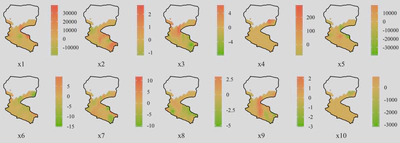R语言空间分布图绘制模板
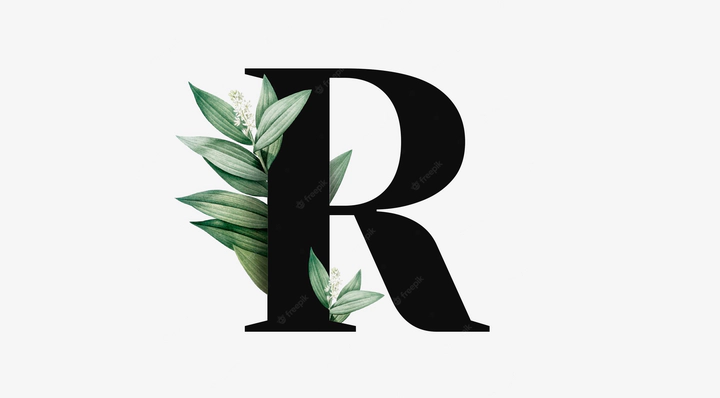
在熟悉绘图函数及其参数设置后,形成一套通用模板有助于提高制图效率。本文展示了两种基于R语言ggplot2包的空间分布图绘制代码。
一、单一矢量图
## library
library(sf)
library(ggplot2)
## read data
Boundary_China <- st_read('Boundary_China.shp')
Province_China <- st_read('Province_China.shp')
## plot
ggplot()+
geom_sf(data = Province_China,
aes(fill = GDP_2000.)) +
geom_sf(data = Boundary_China,
fill = "transparent",
color = "black",
linewidth = 0.2)+
coord_sf(crs = st_crs(Province_China)) +
scale_fill_distiller(palette = "RdYlBu") +
labs(x = "Longitude (°)",
y = "Latitude (°)") +
theme_bw() +
theme(text = element_text(family = "serif",
size = 7),
panel.grid = element_blank(),
legend.key.width = unit(7, "pt"),
legend.key.height = unit(25, "pt"),
legend.margin = margin(0,0,0,0),
legend.title = element_blank(),
axis.ticks = element_line(linewidth = 0.3),
axis.text = element_text(color = "black"))
## save
ggsave("fig1.jpg",
width = 9,
height = 7,
units = "cm",
dpi = 600)
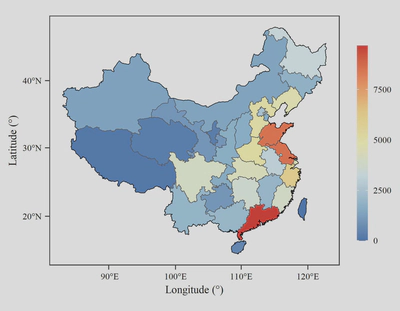
二、单一栅格图
## library
library(raster)
library(ggplot2)
## read data
Boundary_Heihe <- st_read('Boundary_Heihe.shp')
Elevation_Heihe <- raster("Elevation_Heihe.tif")
Elevation_Heihe_mask <- mask(Elevation_Heihe,Boundary_Heihe)
Elevation_Heihe_mask_df <- as.data.frame(as(Elevation_Heihe_mask,"Raster"),
xy=T)
## plot
ggplot() +
geom_raster(data = Elevation_Heihe_mask_df,
mapping = aes(x=x,
y=y,
fill = Elevation_Heihe)) +
geom_sf(data = Boundary_Heihe,
color = "black",
fill = "transparent",
linewidth = 0.3)+
scale_fill_gradientn(colors = terrain.colors(6),
na.value = "transparent",
n.breaks = 5) +
scale_x_continuous(limits = c(96.9,102.1),
expand = c(0,0)) +
scale_y_continuous(limits = c(37.6,42.8)
,expand = c(0,0)) +
labs(x = "Longitude (°)",
y = "Latitude (°)") +
theme_bw() +
theme(text = element_text(family = "serif",
size = 7),
panel.grid = element_blank(),
legend.margin = margin(0,0,0,0),
legend.title = element_blank(),
legend.key.height = unit(23, "pt"),
legend.key.width = unit(8, "pt"),
axis.text = element_text(color = "black"),
axis.ticks = element_line(linewidth = 0.3))
## save
ggsave("fig2.jpg",
width = 9,
height = 7,
units = "cm",
dpi = 800)
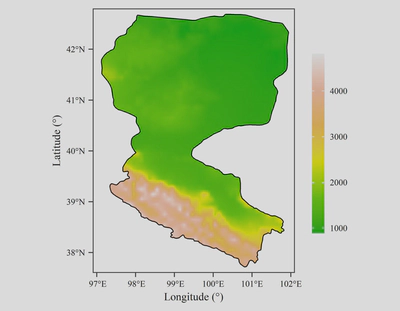
三、多矢量图
## library
library(sf)
library(ggplot2)
library(ggpubr)
## read data
Boundary_China <- st_read('Boundary_China.shp')
Province_China <- st_read('Province_China.shp')
## plotfun
plotfun <- function(fillname, title){
ggplot()+
geom_sf(data = Province_China,
aes_string(fill = fillname)) +
geom_sf(data = Boundary_China,
fill = "transparent",
color = "black",
linewidth = 0.2)+
coord_sf(crs = st_crs(Province_China)) +
scale_fill_distiller(palette = "RdYlBu") +
labs(x = "Longitude (°)",
y = "Latitude (°)") +
theme_bw() +
theme(text = element_text(family = "serif",
size = 7),
panel.grid = element_blank(),
legend.key.width = unit(30, "pt"),
legend.key.height = unit(8, "pt"),
legend.margin = margin(0,0,0,0),
legend.title = element_blank(),
axis.ticks = element_line(linewidth = 0.3),
axis.text = element_text(color = "black"))
}
a <- plotfun("GDP_1997.", "(a)")
b <- plotfun("GDP_1998.", "(b)")
c <- plotfun("GDP_1999.", "(c)")
d <- plotfun("GDP_2000.", "(d)")
ggarrange(a, b, c, d,
ncol = 2,
nrow = 2,
common.legend = T,
legend = "bottom")
## save
ggsave("fig3.jpg",
width = 14,
height = 12,
units = "cm",
dpi = 800)
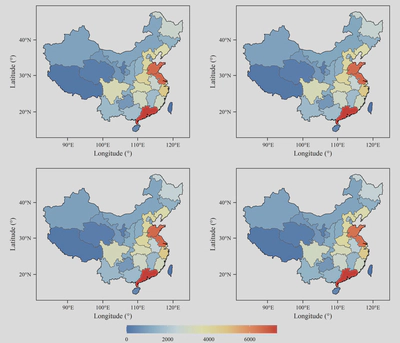
四、多栅格图
## library
library(raster)
library(ggpubr)
library(ggplot2)
library(sf)
## read data
load("20170904.RData")
Boundary_Heihe <- st_read('Boundary_Heihe.shp')
## function
fmt_dcimals <- function(decimals=0){
function(x) as.character(round(x,decimals))
}
plotfun <- function(df, caption){
options(digits=2)
ggplot()+
geom_tile(data=df,aes(x = x,
y = y,
fill = layer))+
geom_sf(data = Boundary_Heihe,
color = "black",
fill = "transparent",
linewidth = 0.3)+
scale_fill_gradient2(low = "#63C601",
high = "#FF543F",
mid = "#EFC15C",
na.value="transparent",
midpoint = 0,
labels = fmt_dcimals(2))+
labs(caption = caption)+
scale_x_continuous(limits = c(97,102.1),expand = c(0,0))+
scale_y_continuous(limits = c(37.6,42.8),expand = c(0,0))+
theme_bw()+
theme(text = element_text(family = "serif",
size = 7),
panel.grid = element_blank(),
panel.border = element_blank(),
legend.key.height = unit(10, "pt"),
legend.key.width = unit(7, "pt"),
plot.margin = margin(0,0,0,0),
legend.margin = margin(0,0,0,0),
plot.caption = element_text(hjust = 0.5,
size = 7),
legend.title = element_blank(),
axis.text = element_blank(),
axis.ticks = element_blank(),
axis.title = element_blank())
}
# plot
plots <- list()
for (plotno in 2:11){
r <- raster(gwr.coef001[,,plotno], xmn = 96, xmx = 103, ymn = 36, ymx = 44)
mask_area <- mask(r,Boundary_Heihe)
df<- as.data.frame(as(mask_area,"Raster"),xy=T)
a <- plotfun(df, paste0("x",plotno-1))
plots<-append(plots,list(a))
}
ggarrange(plotlist = plots,
nrow=2, ncol = 5,
align = "hv")
## save
ggsave("fig4.jpg",
width = 14,
height = 5,
units = "cm",
dpi = 800)
